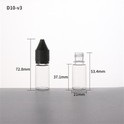Plastic is one of the most popular and useful materials of modern times and it is important that we optimise the lifespan of plastics as much as possible. Worldwide we produce 300 million tonnes of plastic each year and most people are re-using and recycling their plastics.
Why is it important to recycle plastic?
Plastic is a popular and highly versatile material, and we use a lot of it. Re-using and recycling items as many times as possible can reduce our need to create new plastic.
This means we can:
conserve non-renewable fossil fuels (oil)
reduce the consumption of energy used in the production of new plastic
reduce the amount of solid waste going to landfill
reduce emission of gases like carbon dioxide into the atmosphere.
How is plastic recycled?
Plastics are:
Sorted by polymer type
Shredded
Washed
Melted
Pelletised
Made into new products.
It is a two-stage process:
Sorting is mainly done automatically with a manual sort to ensure all contaminants have been removed.
Once sorted and cleaned, plastic can either be shredded into flakes or melt processed to form pellets before finally being moulded into new products.
There are many different types of plastic in use. Whilst we have been able to recycle some of these in the UK for some time, there is now ongoing large investments in the technology required to expand the scope of plastic materials we are able to recycle including items such as those used to make flexible pouches. Whilst more different types of plastic are being recycled, there are some types that still go to landfill, are incinerated or are transported abroad for recycling.






